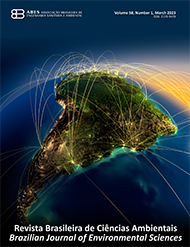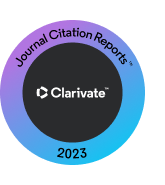Inoculation of plant growth-promoting bacteria on Pennisetum purpureum Schumach cultivar BRS Capiaçu
DOI:
https://doi.org/10.5327/Z2176-94781916Keywords:
biotechnology; forage; microorganism-plant; sustainability.Abstract
Pennisetum purpureum (Schumach) cultivar BRS Capiaçu stands out from other forage species for its high production capacity. In order to improve plant management in the field, it is necessary to standardize the germination/emergence of seeds or seedlings, as well as rapid plant development. The use of plant growth-promoting bacteria is, therefore, a viable and sustainable strategy, especially as it reduces the environmental damage caused by the trivial use of various agricultural inputs. This study aimed to evaluate the germination and morphological and physiological characteristics of BRS Capiaçu seedlings after inoculation of the stalk/seedlings with plant growth-promoting bacteria isolated from Brachiaria decumbens Stapf. and Brachiaria humidicola (Rendle.) Schweickerdt. The experiment was carried out in a completely randomized design, with two evaluations, on the 11th and 25th days after inoculation. Nineteen treatments were evaluated: 16 bacterial inoculants, two commercial inoculants (Biomais® and Biomaphos®), and one control without inoculation. All treatments were kept in a germination chamber at 25°C, standard deviation ±5°C under a 12-hour photoperiod. Bacterial inoculations promoted increases in germination and morphological and physiological characteristics of BRS Capiaçu seedlings on the 11th and 25th days after their inoculations, surpassing the control treatment and sometimes resembling or surpassing the commercial inoculums. Bacteria isolated from B. decumbens and with high indoleacetic acid production provided the greatest increases in seedling development. Finally, it can be concluded that bacterial inoculums, in addition to improving the establishment of Capiaçu plants, are an effective and sustainable alternative to the use of synthetic products, contributing to a more environmentally balanced agricultural ecosystem.
Downloads
References
Abdelaal, K.; Alkahtani, M.; Attia, K.; Hafez, Y.; Király, L.; Kunstler, A., 2021. The role of plant growth-promoting bacteria in alleviating the adverse effects of drought on plants. Biology (Basel), v 10, (6), 520. https://doi.org/10.3390/biology10060520
Azevedo, J.L.; Maccheroni, M.J.R.; Pereira, J.O.; Araújo, W.L., 2000. Endophytic microorganisms: a review on insect control and recent advances on tropical plants. Electronic Journal of Biotechnology, v. 3, (1). https://doi.org/10.2225/vol3-issue1-fulltext-4
Barreto, G.P.; Lira, M.A.; Santos, M.V.F.; Dubeux Júnior, J.C.B., 2001. Avaliação de clones de capim-elefante (Pennisetum purpureum Schum.) e de um fíbrido com o milheto (Pennisetum glaucum (L.) R. Br.) submetidos a estresse hídrico. 1. Parâmetros Morfológicos. Revista Brasileira de Zootecnia, v. 30, (1), 1-6. https://doi.org/10.1590/S1516-35982001000100001
Battisti, R.; Vendruscolo, G., 2023. Isolamento e caracterização de bactérias com potencial de promoção de crescimento vegetal a partir de cama de aviário. Editora Dialética, Palotina.
Brasil, 2009. Regras para análise de sementes. Ministério da Agricultura, Pecuária e Abastecimento, Brasília, 398 p.
Da Costa, S.; Cardoso, A.; Castro, G.; Júnior, D.; Silva, T.; Silva, G., 2022. Co-inoculation of Trichoderma asperellum with Bacillus subtilis to promote growth and nutrient absorption in Marandu grass. Applied and Environmental Soil Science, v. 2022, (3228594), 1-13. https://doi.org/10.1155/2022/3228594
Deus, T. R. V.; Giongo, V.; Salviano, A.; Santana, M.; Silva, V.; Santos, T., 2022. Selection of green manures to provide ecosystem services in a Semi-arid environment. Revista Brasileira de Ciências Ambientais (RBCIAMB), v. 57, (3), 409-421. https://doi.org/10.5327/Z2176-94781268
Ecco, M.; Junior, V.; Lucas, V.; Nunes, R., 2022. Inoculação por diferentes produtos à base de Azospirillum brasilense na cultura do trigo. Revista Ciência Agrícola, v. 20, (1), 9-17. https://doi.org/10.28998/rca.v20i1.10537
Elnahal, A.; Saadony, M.; Saad, A.; Desoky, M.; Tahan, A.; Rady, M.; AbuQamar, S.; El-Tarabily, K., 2022. The use of microbial inoculants for biological control, plant growth promotion, and sustainable agriculture: A review. European Journal of Plant Pathology, v. 162. https://doi.org/10.1007/s10658-022-02472-3
Ferreira, D.F., 2007. SISVAR: um programa para análises e ensino de estatística. Revista Symposium, v. 6, (2), 36-41.
Figueredo, E.F.; Cruz, T.A.D.; Almeida, J.R.; Batista, B.D.; Marcon, J.; Andrade, P.A.M.; Hayashibara, C.A.A.; Rosa, M.S.; Azevedo, J.L.; Quecine, M.C., 2023. The key role of indole-3-acetic acid biosynthesis by Bacillus thuringiensis RZ2MS9 in promoting maize growth revealed by the ipdC gene knockout mediated by the CRISPR-Cas9 system. Microbiological Research, v. 266, 127218. https://doi:10.1016/j.micres.2022.127218
Frota, R.; Studart, T.; Filho, F.; Silva, S.; Soares, R., 2020. Groundwater vulnerability to agrochemical contamination. Revista Brasileira de Ciências Ambientais (RBCIAMB), v. 55, (4), 440-455. https://doi.org/10.5327/Z2176-947820200531
Fukami, J.; Abrantes, J.; Cerro, P.; Nogueira, M.; Ollero, F.; Megías, M.; Hungria, M., 2018. Revealing strategies of quorum sensing in Azospirillum brasilense strains Ab-V5 and Ab-V6. Archives of Microbiology, v. 200, 47-56. https://doi.org/10.1007/s00203-017-1422-x
Guimarães, S.G.; Rondina, A.B.L.; Junior, A.G.O.; Jank, L.; Nogueira, M.A.; Hungria, M., 2023. Inoculation with plant growth-promoting bacteria improves the sustainability of tropical pastures with Megathyrsus maximus. Agronomy, v. 13, (3), 734. https://doi.org/10.3390/agronomy13030734
Hammer, Ø.; Harper, D.A.T.; Ryan, P.D., 2001. PAST: paleontological statistics software package for education and data analysis. Palaeontologia Electronica, v. 4, (1), 1-9.
Kuklinsky-Sobral, J.; Araújo, W.L.; Mendes, R.; Geraldi, I.O.; Pizzirani-Kleiner, A.A.; Azevedo, J.L., 2004. Isolation and characterization of soybean-associated bacteria and their potential for plant growth promotion. Environmental Microiology, v. 6, (12), 1244-1251. https://doi.org/10.1111/j.1462-2920.2004.00658.x
Li, X.; Geng, X.; Xie, R.; Fu, L.; Jiang, J.; Gao, L.; Sun, J., 2016. The endophytic bacteria isolated from elephant grass (Pennisetum purpureum Schumach) promote plant growth and enhance salt tolerance of Hybrid Pennisetum. Biotechnology for Biofuels, v. 9, (1), 190. https://doi/10.1186/s13068-016-0592-0
Lima, D.; Santos, I.; Oliveira, J.; Costa, D.; Queiroz, J.; Romagnoli, E.; Andreote, F.; Freire, F.; Sobral, J., 2021. Genetic diversity of N-fixing and plant growth-promoting bacterial community in different sugarcane genotypes, association habitat and phenological phase of the crop. Archives of Microbiology, v. 203, 1089-1105. https://doi:10.1007/s00203-020-02103-7
Maguire, J.D., 1962. Speed of germination-aid in selection and evaluation for seedlings emergence and vigor. Crop Science, v. 2, (2), 176-177. https://doi.org/10.2135/cropsci1962.0011183X000200020033x
Martins, C.; Mesquita, A.; Bandeira, L.; Cavalcante, F.; Ribeiro, G.; Martins, S., 2023. In vitro co-inoculation of rhizobacteria from the semi-arid aiming at their implementation as bio-inoculants. Revista Brasileira de Ciências Ambientais (RBCIAMB), v. 58, (1), 59-66. https://doi.org/10.5327/Z2176-94781481
Mendes, R.; Kruijt, M.; de Bruijn, I.; Dekkers, E.; van der Voort, M.; Schneider, J.H.; Piceno, M.Y.; De Santis, T.Z.; Andersen, G.L.; Bakker, P.A.H.M.; Raaijmakers, J.M., 2011. Deciphering the rhizosphere microbiome for disease-suppressive bacteria. Science, v. 332, (6033), 1097-1100. https://doi.org/ 10.1126/science.1203980
Miljakovi’c, D.; Marinković, J.; Tamindžić, G.; Đorđević, V.; Tintor, B.; Milošević, D.; Ignjatov, M.; Nikolić, Z., 2022. Bio-Priming of Soybean with Bradyrhizobium japonicum and Bacillus megaterium: Strategy to improve seed germination and the initial seedling growth. Plants, v. 11, (15), 1927. https://doi.org/10.3390/plants11151927
Moreno, L.; Cunha, M.; Oiveira, L., 2022. Capim BRS Quênia: Produtividade de forragem sob diferentes estratégias de calagem e adubação no Tocantins. Tocantins, Embrapa Pesca e Aquicultura. v. 7 (Accessed January 31, 2023) at:. https://www.embrapa.br/busca-de-publicacoes/-/publicacao/1139905/capim-brs-quenia-produtividade-de-forragem-sob-diferentes-estrategias-de-calagem-e-adubacao-no-tocantins
Mutumba, F.; Zagal, E.; Gerding, M.; Castillo-Rosales, D.; Paulino, L.; Schoebitz, M., 2018. Plant growth promoting rhizobacteria for improved water stress tolerance in wheat genotypes. Journal of Soil Science and Plant Nutrition Temuco, v. 18, (4), 1080-1096. https://doi.org/10.4067/S0718-95162018005003003
Nascimento, A.; de Oliveira, B.P.M.; de França, J.; da Silva Siqueira, T.; Andrade, M.F.; Tabosa, J.N., 2024. A evolução genética do gênero sorghum e a importância do cereal para a economia mundial e a promoção da segurança alimentar a nível global: uma revisão integrativa. Revista de Gestão e Secretariado, v. 15, (2), e3552. https://doi.org/10.7769/gesec.v15i2.3552
Oliveira, J.T.C.; Pereira, A.P.A.; de Souza, A.J.; Kuklinsky-Sobral, J.; Freire, F.J.; dos Santos, M.V.F.; de A. Lira, M., 2022. Inoculation with plant-growth promoting bacteria improves seed germination and initial development of Brachiaria decumbens. Anais da Academia Brasileira de Ciências, v. 94, (1), e20200124. https://doi.org/10.1590/0001-37652202220200124
Oliveira, J.T.; Silva, G.T.; Diniz, W.P.S.; Figueredo, E.F.; Santos, I.B.; Lima, D.R.M.; Quecine, M.C.; Kuklinsky-Sobral, J.; Freire, F.J.;2018. Diazotrophic bacteria isolated from Brachiaria spp.: genetic and physiological diversity. Ciencia e Investigación Agraria: Revista Latinoamericana de Ciencias de la Agricultura, v. 45, (3), 277-289 (Accessed January 12, 2023) at:. https://dialnet.unirioja.es/servlet/articulo?codigo=6791735
Pascutti, D.; Silvestre, F.; Ortiz, T., 2024. The role of microorganisms in sustainable agriculture: a review. DELOS: Desarrollo Local Sostenible, v. 17, (52), e1253. https://doi.org/10.55905/rdelosv17.n52-001
Ramakrishna, W.; Yadav, R.; Li, K., 2019. Plant growth promoting bacteria in agriculture: Two sides of a coin. Applied Soil Ecology, v. 138, 10-18. https://doi.org/10.1016/j.apsoil.2019.02.019
Rilling J.I.; Acuña J.J.; Nannipieri, P.; Cassan, F.; Maruyama, F.; Jorquera, M.A., 2019. Current opinion and perspectives on the methods for tracking and monitoring plant growth‒promoting bacteria. Soil Biology and Biochemistry, v. 130, 205-219. https://doi.org/10.1016/j.soilbio.2018.12.012
Reis, F.B.; Silva, M.; Teixeira, K.; Urquiaga, S.; Reis, V., 2004. Identificação de isolados de Azospirillum amazonense associados a Brachiaria spp.; em diferentes épocas e condições de cultivo e produção de fitormônio pela bactéria. Revista Brasileira de Ciências do Solo, v. 28, (1), 103-113. https://doi.org/10.1590/S0100-06832004000100011
Rebetzke, G.; Richards, R.; Fettell, N.; Long, M., 2007. Genotypic increases in coleoptile length improves stand establishment, vigour and grain yield of deep-sown wheat. Field Crop, v. 100 (1), 10-23. https://doi.org/10.1016/j.fcr.2006.05.001
Rodrigues, A.; Forzani, M.; Soares, R.; Sibov, S.; Vieira, J., 2016. Isolamento e seleção de bactérias promotoras de crescimento vegetal associadas a cana-de-açúcar. Pesquisa Agropecuária Tropical, v. 46, (2), 149-158. https://doi.org/10.1590/1983-40632016v4639526
Souza, M.; Baura, V.; Santos, S.; Júnior, P.; Junior, F.; Marques, M.; Paggi, G.; Brasil, M., 2017. Azospirillum spp. from native forage grasses in Brazilian Pantanal floodplain: biodiversity and plant growth promotion potential. World Journal of Microbiology and Biotechnology, v. 33, 81. https://doi.org/10.1007/s11274-017-2251-4
Siri-Prieto, G.; Bustamante, M.; Picasso, V.; Ernst, O., 2020. Impact of nitrogen and phosphorous on biomass yield, nitrogen efficiency, and nutrient removal of perennial grasses for bioenergy. Biomass and Bioenergy, v. 136, 105526. https://doi.org/10.1016/j.biombioe.2020.105526
Taiz, L.; Zeiger, E.; Moller, IM.; Murphy, A., 2017. Fisiologia e desenvolvimento vegetal. 6. ed. Artmed, Porto Alegre. 858 p.
Teodoro, A.G.; de Souza França, A.F.; Backes, C.; Santos, A.J.M.; Firmino, A.E.; Ferreira, R.N.; de Freitas, P.V.D.X., 2024. Inoculação do capim Megathyrsus maximus por bactérias do gênero Azospirillum associado a adubação nitrogenada. Observatório de la Economia Latinoamericano, v. 22, (4), e4244. https://doi.org/10.55905/oelv22n4-141
Trabelsi, A.; El Kaibe, M.A.; Abbassi, A.; Horchani, A.; Ghedira, L.C.; Ghedira, K., 2020. Phytochemical study and antibacterial and antibiotic modulation activity of punica granatum (pomegranate) leaves. Hindawi Scientifica, v. 2020, (8271203), 1-7. https://doi.org/10.1155/2020/8271203
Ünuvar, Ö. C.; Zencirci, N.; Ünlu, E, 2022. Bacteria isolated from Triticum monococcum ssp. monococcum roots can improve wheat hologenome in agriculture. Molecular Biology Reports, v. 49, 5389-5395. https://doi.org/10.1007/s11033-022-07118-5
Wanga, L.; Su, C.W.; Liu, J.; Dong, Y., 2024. Sustainable development or smoke?: the role of natural resources, renewable energy, and agricultural practices in China. Resources Policy, v. 88, 104512. https://doi.org/10.1016/j.resourpol.2023.104512
Zerbe, S.; Miller, A.; Ferreira, S.; Löbmann, M.; Schermer, M.; Foschiera, A., 2022. An outlook on the future of Brazilian agriculture: how farming students of Tocantins perceive sustainability in the Cerrado. Revista Brasileira de Ciências Ambientais (RBCIAMB), v. 57, (2), 215-229. https://doi.org/10.5327/Z2176-94781328
Published
How to Cite
Issue
Section
License
Copyright (c) 2024 Revista Brasileira de Ciências Ambientais (RBCIAMB)

This work is licensed under a Creative Commons Attribution 4.0 International License.

























